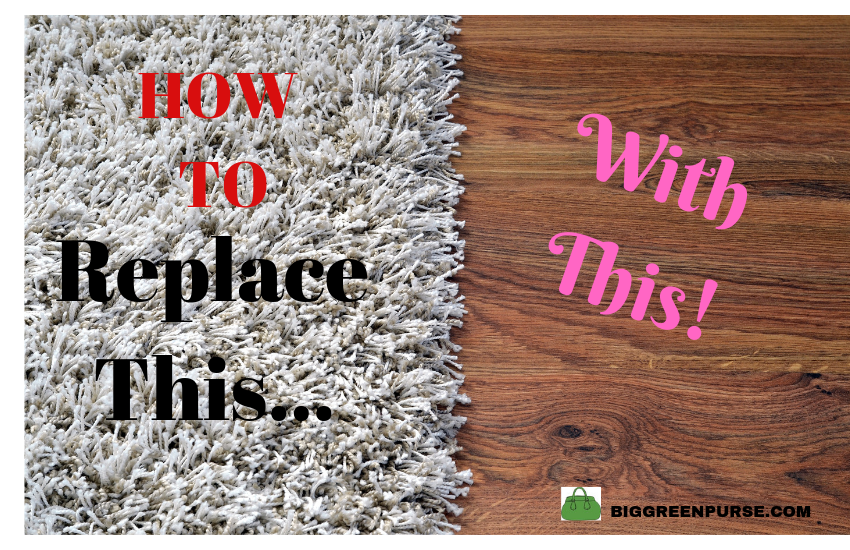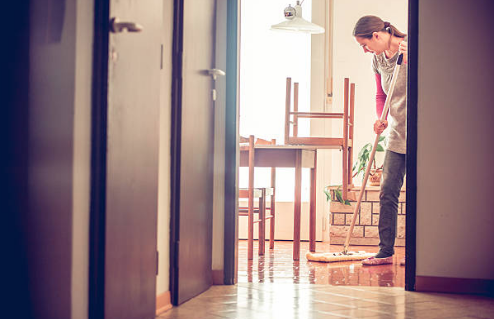I gave up my wall-to-wall carpeting because I got tired of cleaning it all the time. Even when we all took our shoes off at the door, the carpet never seemed clean. That led to a lot of vacuuming! And when it needed to be washed, which it did a couple of times a year, it actually made me sick. Many carpet cleansers contain volatile chemicals that cause serious allergic reactions. I got what I thought was the flu once when it was just a very serious reaction to the chemicals in the carpet cleaning solution.
(You can read all about it in “How Carpet Cleaning Almost Killed Me!“)
Once I decided to replace my carpeting with wood, I wanted the most eco friendly wood floor option available. I chose wood rather than tile because tile can get so cold; unless you’re in the tropics, tile is better suited for a bathroom or kitchen than a living room. Here’s something else I learned: wood offers seven times better insulation than ceramic tiles. That could save me money on my energy bill.
I didn’t want cork, either, because I was re-flooring my entire great room: a living room/dining room space that just wouldn’t work if it was all cork. Also, I had teenagers home at the time and I knew how hard they could be on floors.
Besides, I just liked the cozy look of wood flooring.
Now that I’ve gone through the process of re-flooring my space (pictured below), I wanted to share some tips with you if you’re thinking of doing the same thing. They’re brought to you by Lifestyle Flooring UK and Kährs, a European company committed to sustainability and PVC-free flooring. (Here’s another thing I like about Kährs: they have an entirely solvent-free production process to minimize the use and disposal of toxic chemicals during production).

Consider Using Reclaimed or Upcycled Wood Flooring – This is not the cheapest option by any means. But it’s among the most eco friendly. That’s because it uses wood that’s been reclaimed from an old barn, warehouse, house, even horse fence. (There’s a lot of wood reclaiming going on in some of Detroit’s neighborhoods, where a the city’s renaissance is leading to all kinds of usable goods being recovered from abandoned homes and buildings). It doesn’t involve new trees or the production of new wood.
Choose Wood From Forests That Meet FSC Standards – The Forest Stewardship Council, or FSC, is an international group that promotes “environmentally sound, socially beneficial, and economically prosperous management of the world’s forests. responsible forest management.” FSC-certified forests are supposed to protect water quality, prohibit harvesting of rare old-growth forests, prevent loss of natural forest cover and prohibit use of highly hazardous chemicals. For example, FSC prohibits the use of the pesticide atrazine because it has been shown to cause water pollution and birth defects.
Look For Floors That Can Contribute to Your LEED Certification – LEED stands for Leadership in Energy and Environmental Design. LEED-rated buildings save energy, water, and resources, generate less waste, and support human health. Having a LEED-certified home increases its market value, too.
Avoid Wood Processed With Toxic Chemicals to Protect Your Indoor Air – Kährs, for example, uses a water-based lacquer system to reduce emissions. Other chemicals to avoid, especially in pressed wood flooring, are volatile glues and formaldehyde. Some flooring planks are made that allow the boards to mechanically lock together, rather than need glue.
Support Manufacturers The Minimize Waste –Kährs sends waste wood, saw dust, bark, and wood chips to a local energy company. It claims that around 6,150 Swedish homes per year heat their homes using recycled wood waste.
By the way, whatever floor you install, make sure to finish it with a zero VOC (volatile organic compound) finish. That way, you’ll avoid nasty fumes that could pollute your indoor air and make your sick. I used a water-based finish on mine and wasn’t sick for a minute!
Non-Toxic Wood Floor Care
Once you do install your floor, it’s easy to take care of in a non-toxic way. I’ve pulled together my five best suggestions for you in this post:
My Top 5 Secrets to Non-Toxic Wood Floor Care
Here’s a Final Recommendation: Recycle Your Carpet!
We found a facility near our home that would take all our carpet and recycle it into new materials. That was great, because most carpeting and padding can be recycled into new products. You can go here to find a place near you that will accept carpeting for recycling.
NOTE: Partnering with sponsors helps us bring you the expert content you need to lead the greener life you want. All editorial opinions remain our own.


















4 thoughts on “How to Replace Wall-to-Wall Carpeting With An Eco Friendly Wood Floor”
Wood flooring comes in a wide variety of materials, but not come in as many colors as carpet. Natural colors of different types of wood, can give the advantage of blending in and complementing almost anything in the room. If you want, you can view online and check out the some of the latest advancements and improvements that make wood resistant to stains, scratches and termite destruction, the choice of wood flooring makes it very easy to keep your house tidy and neat.
This looks great. I recycled my carpet.
That’s great to hear!
Comments are closed.